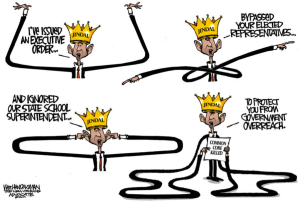Latest on Common Core – Round 2
Last week, Governor Bobby Jindal played to his national ambitions and announced his plans to take Louisiana out of Common Core and PARCC. The Louisiana Department of Education and the State Board of Elementary and Secondary Education (BESE) responded saying they plan to stay the course on Common Core and PARCC, resulting in confusion among educators and the public.
Educate Now! will try and cut through the clutter and distill the salient points.
First, a primer:
Standards: What we expect students to know and be able to do. In the past, every state had its own standards, but in 2010, BESE adopted the Common Core State Standards (CCSS), along with more than forty other states.
Curriculum: What teachers use in the classroom to teach the standards. Districts, schools and teachers have the autonomy to pick the actual teaching materials and manner in which they want to teach. The state has issued curriculum guides to assist educators, but there is no set national or state curriculum.
Tests: How we assess student mastery of the standards. Well-designed tests are expensive and take time to develop. Louisiana joined a consortium of states to create the Partnership for Assessment of Readiness for College and Careers, or PARCC test, while a different consortium of states created the Smarter Balance test. Both groups began working on the tests in 2010 and field tested questions for quality and rigor in 2013 and 2014. Fifty thousand Louisiana students took a PARCC field test this year, giving schools experience in administering the test while further “testing” the questions for quality, clarity and rigor.
Now to last week’s events …
Common Core: The governor will not win this one.
The standards are still in place, and the governor cannot force BESE to adopt new standards. While Jindal’s executive order asked the legislature to adopt new standards, he cannot require them to do so, and the legislature just rejected this request last session.
PARCC test: The Battleground
The Governor’s only option is to try and use the Division of Administration (DOA) to kill the PARCC test. It is unclear if he will succeed.
The governor issued a number of executive orders, wrote letters and made a speech for his national audience. For Louisiana, the crux of the issue gets down to a letter the DOA sent the State Superintendent later in the day on Wednesday, after the governor’s executive orders had been issued.
The Department of Education has a testing vendor, which long ago met the state’s procurement process and was approved by the DOA. The testing vendor’s contract makes it responsible for many things, including assembling the test, purchasing test questions, grading the tests, doing erasure and plagiarism analysis, etc. The vendor, DRC, has routinely bought test questions from Iowa and other test providers. DRC acts as the “general contractor,” and PARCC would be a “subcontractor,” providing questions used in the administration of the spring 2015 tests.
At the governor’s direction, the Division of Administration suspended DRC’s contract pending further review, arguing that “The Department of Education has suggested it has unlimited authority to use a state contract, paid for by taxpayers, for a purpose for which it was not intended.”
DCR’s contract has been in place since 2003 and was amended, with DOA’s approval, to include the purchase of test questions aligned with the Common Core. This contract was intended to provide for Louisiana’s 2015 test, which by state law is aligned with “nationally recognized content standards.”
While this suspension is in effect, the Department of Education does not have a testing vendor and therefore has no test.
How will this standoff play out?
A number of scenarios are possible:
- It is resolved in the courts. There are a number of legal avenues to consider:
- While there is potential for a suit on constitutional grounds, this case could take many months or years to make its way through the system.
- Educate Now! suspects that BESE or another entity will go to court soon to seek an injunction “suspending” the suspension of the DRC contract, which would allow BESE to use DRC as a test vendor while the case is litigated.
- A compromise of some sort is reached. One of the governor’s executive orders prohibited the purchase of questions from PARCC or Smarter Balance. There may be other test providers aligned with Common Core, although none would provide state-to-state comparability.
- BESE finds a way to procure the test outside of DOA.
- No test is given. If the issue is not resolved in time for test questions to be purchased and the test to be administered in spring 2015, then grades 3-8 will not be tested in English and math. Realize, however, that having no test:
- Violates federal law: No Child Left Behind requires states to test students in grades 3-8. If Louisiana does not test, it risks losing hundreds of millions in federal funding.
- Violates state law: BESE is required to test students.
- Suspends all school accountability for the year: There will be no way to measure or report on school performance, determine which students qualify for vouchers, etc.
The Larger Issue
In the three other states that have withdrawn from the Common Core (Indiana, Oklahoma and South Carolina), the respective legislatures voted to exit; no other governor has tried to do it by decree. The legal precedent of the governor’s use of Executive Power is extremely worrisome. The DOA’s authority to review contracts is supposed to be an administrative function to make certain the various departments of state government follow state procurement laws, budget parameters and other legal requirements. The governor is using DOA as a weapon to override the constitutionally established legislative branch and the state board of education.
Given the governor’s attacks on Obama’s abuse of power, Jindal’s executive overreach is truly ironic … and disturbing.
Stay tuned for Round 3!
Here’s a little humor from Walt Handelsman.

